“I’m worried that I’m not as mentally healthy as I should be, and I often wonder if there’s something wrong with me.”
Surajit Roy
A mental health condition is something that a person has that makes them think, feel, or act differently than most people. A diagnosis of a mental health condition is when a doctor or other mental health professional says that a person has a certain condition. A person’s primary care doctor may be involved in a diagnostic assessment or make referrals to a mental health specialist.
How you feel, think, and act determines your mental health. People occasionally experience issues with their mental health, which can make them feel bad or make it difficult for them to function. The actions that are deemed typical or acceptable in a society serve as the definition of mental health issues.
Why do you need a psychologist?
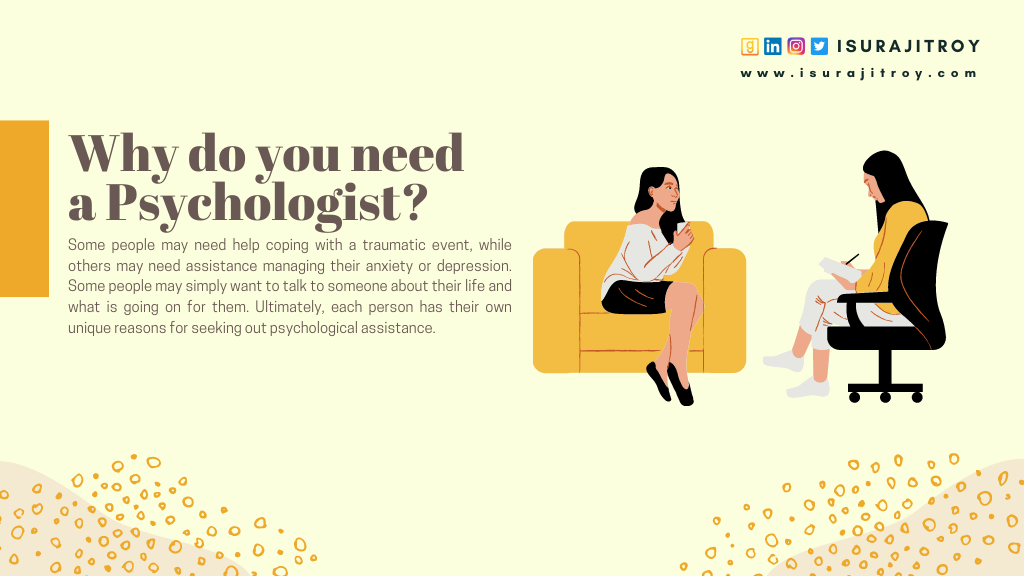
Psychologists are required for mental health treatment in order to provide psychological services to individuals who are experiencing mental health difficulties. Psychologists use their training and skills to help individuals understand their thoughts, emotions, and behaviors in order to help them cope with their mental health difficulties.
- Psychologists are health professionals who are trained to work with people to help them understand and manage their thoughts, feelings, and behaviours. They can work with people of all ages, from children and adolescents to adults.
- Psychologists use a range of different techniques to help people, including psychotherapy, counselling, and psychological testing. They can help people with a wide range of mental health problems, including anxiety, depression, stress, relationship difficulties, and addiction.
- Psychologists can also help people to cope with physical health problems, such as chronic pain, disability, and terminal illness. They can help people to adjust to major life changes, such as bereavement, retirement, and redundancy.
- Psychologists are trained to work with people from all walks of life, from all cultural backgrounds, and with all levels of intelligence. They are committed to providing a confidential, non-judgmental service.
When do you need a psychologist?
If you are feeling like you can’t cope with your day-to-day life, it might be time to see a psychologist. Psychologists are mental health professionals who can help you understand and deal with your emotions. If you’re experiencing any of the following, you might need to see a psychologist:
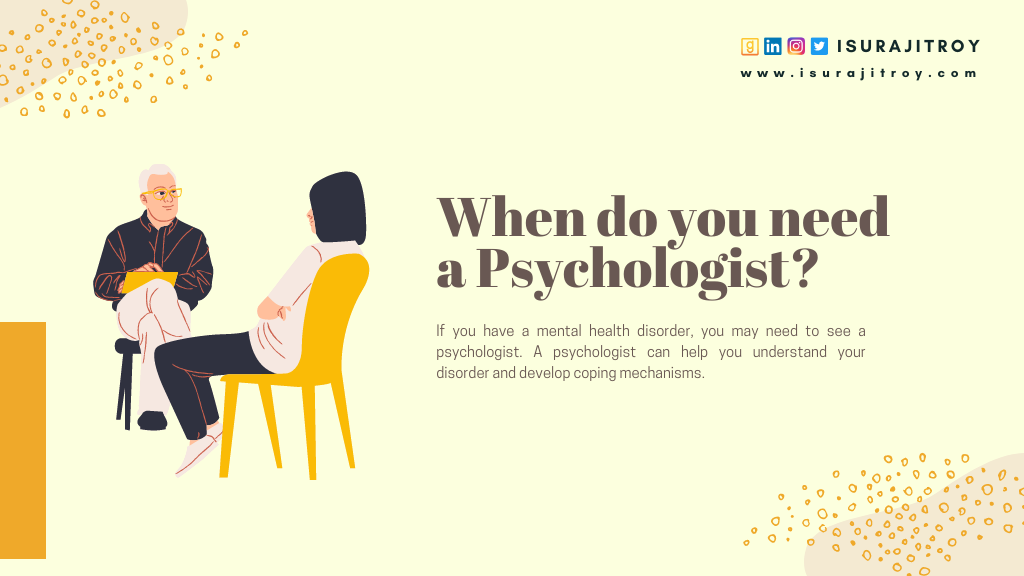
- You’re feeling overwhelmed or stressed out.
- You’re having trouble sleeping or eating.
- You’re having difficulty concentrating.
- You’re feeling hopeless or helpless.
- You’re engaging in self-destructive behaviors.
- You’re experiencing flashbacks or nightmares.
- You’re having intrusive thoughts.
- You’re feeling excessively angry, sad, or anxious.
- You’re isolating yourself from others.
- You’re abusing drugs or alcohol.
If you are struggling with any of these issues, you may benefit from seeing a psychologist. Psychologists can help you understand your thoughts and feelings, identify coping strategies, and work through difficult life experiences. If you are considering seeing a psychologist, it is important to choose someone who is a good fit for you and your needs.
When choosing a psychologist, it is important to consider their training and experience, as well as their approach to counseling. Some psychologists specialize in specific areas, such as child psychology, forensic psychology, or sports psychology. Others may have a more general practice. It is also important to make sure the psychologist you choose is licensed in your state.
If you are not sure if you need to see a psychologist, you can talk to your primary care doctor or another mental health professional, such as a social worker or counselor. They can help you assess your needs and make a referral to a psychologist if they think it would be beneficial.
Psychologist and mental health.

Psychologists and mental health experts play an important role in our society. They help us understand and cope with our emotions, thoughts, and behaviors. They can also help us learn more about ourselves and others. Mental health disorders are common, affecting tens of millions of people around the world. Psychologists and other mental health professionals can help people with these disorders by providing counseling, therapy, and support.
In addition to helping people with mental health disorders, psychologists also conduct research to help us better understand the human mind and behavior. This research can lead to new and improved treatments for mental health disorders. Psychologists and mental health professionals play an important role in our society. They help us to understand and cope with our mental health problems.
Mental health problems can be extremely debilitating, and can prevent us from living our lives to the fullest. Psychologists and mental health professionals can help us to understand our problems, and to find ways to cope with them. Psychologists use a variety of techniques to help their patients. These can include cognitive-behavioral therapy, which helps patients to change their thinking patterns; and interpersonal therapy, which helps patients to improve their relationships with others.
Psychologists also use medication to treat some mental health problems. This can be an extremely effective treatment, but it is important to remember that it is only one part of the treatment process. Psychotherapy is also an important part of treatment. If you are struggling with a mental health problem, I encourage you to seek out the help of a psychologist or other mental health professional. They can help you to understand your problem, and to find ways to cope with it.
How psychologist help you?
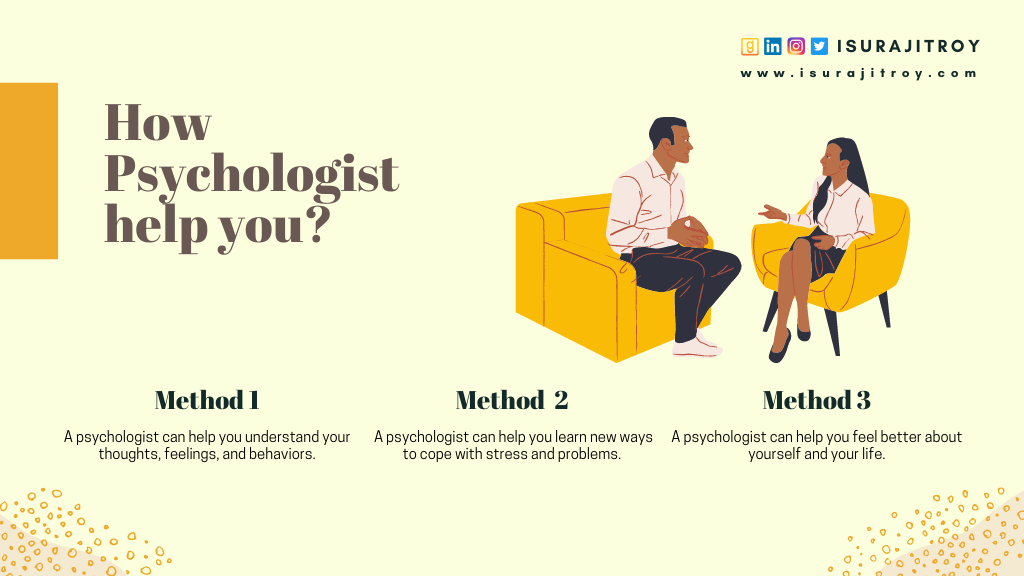
Psychologists can help people in a number of ways. They can provide therapy to people who are struggling with mental health issues, help people to cope with difficult life events, and provide support to people who are going through tough times. Psychologists can also help people to understand themselves and their behavior better. In addition, psychologists can provide guidance and advice on how to make positive changes in your life.
- Psychologists can provide therapy to help you deal with psychological issues.
- Psychologists can provide guidance on how to manage difficult life circumstances.
- Psychologists can provide support to help you cope with stress and anxiety.
- Psychologists can provide tools and techniques to help you improve your communication skills.
- Psychologists can provide tools and techniques to help you manage your time more effectively.
- Psychologists can provide tools and techniques to help you deal with conflict more effectively.
- Psychologists can provide tools and techniques to help you deal with stress in a more positive way.
- Psychologists can provide education on how to deal with different types of mental disorders.
- Psychologists can provide referrals to other professionals if necessary.
- Psychologists can provide support to help you make positive changes in your life.
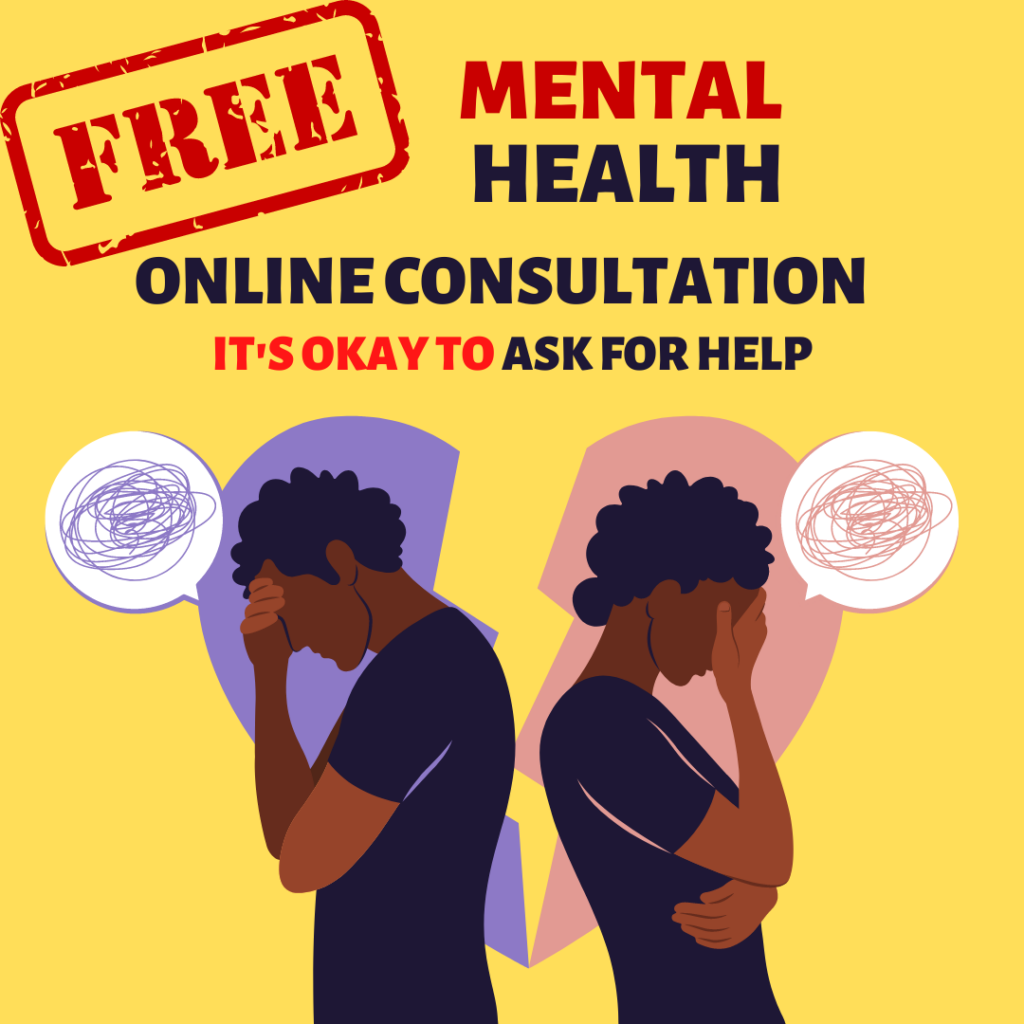
Free Online Therapy
If you or someone you know is struggling with anxiety, depression, PTSD, self-harm, mental breakdown, panic situation, substance abuse, suicidal tendencies or any other form of mental illness, reach out to us for free and confidential evaluation.
Book An AppointmentPsychologist treatment.
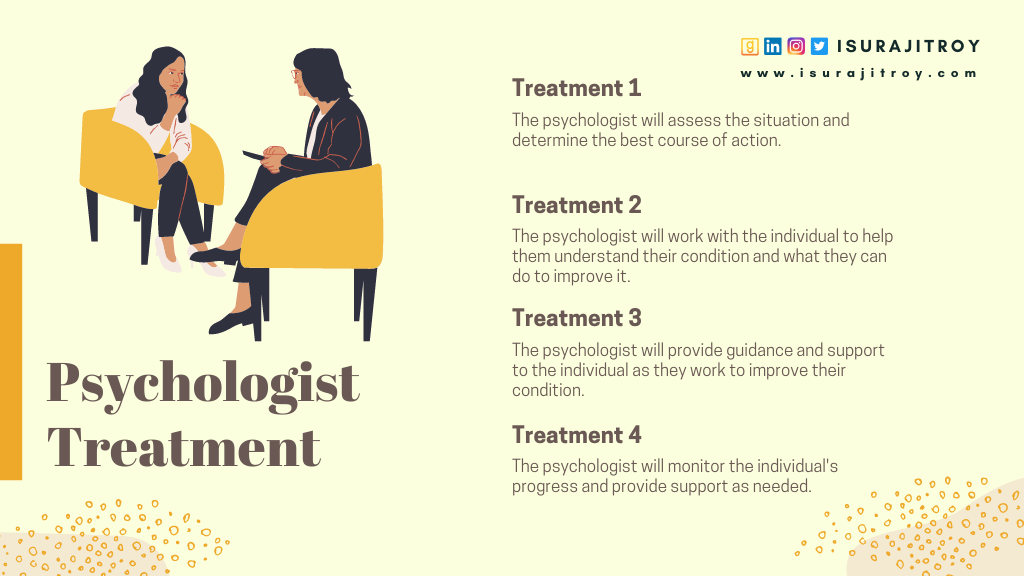
Psychologists are health care professionals who diagnose and treat mental, emotional and behavioral disorders. Common disorders treated by psychologists include depression, anxiety, eating disorders, substance abuse and post-traumatic stress disorder (PTSD). Psychologists use a variety of treatment methods to help their patients, including psychotherapy, behavior therapy and cognitive-behavioral therapy.
Psychotherapy is a type of counseling that helps patients understand and change their thoughts, feelings and behaviors. Behavior therapy is a type of psychotherapy that focuses on changing unhealthy or maladaptive behaviors. Cognitive-behavioral therapy is a type of psychotherapy that helps patients change their negative thoughts and beliefs into more positive ones.
Psychologists often work closely with other health care professionals, such as psychiatrists, to provide the best possible care for their patients.
- The psychologist and client discuss the presenting problem and decide if treatment is appropriate.
- The psychologist and client establish treatment goals.
- The psychologist creates a treatment plan to help the client reach their goals.
- The psychologist and client work together to implement the treatment plan.
- The psychologist and client periodically review progress and make adjustments to the treatment plan as needed.
Seek for help when needed.
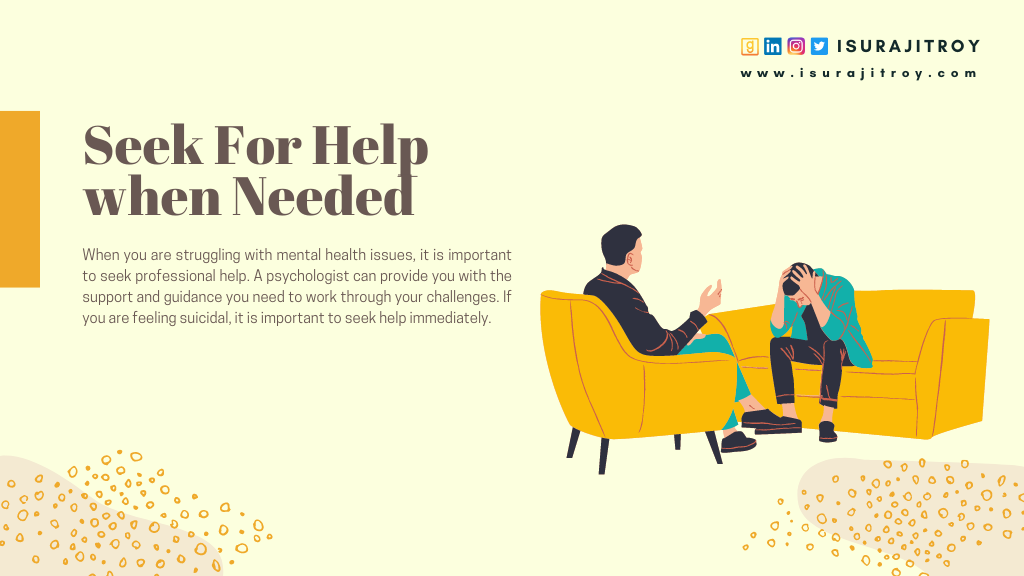
Mental health is essential for our overall well-being. It affects how we think, feel, and act. It also helps determine how we handle stress, relate to others, and make choices. Mental health is important at every stage of life, from childhood and adolescence through adulthood.
If you have a mental health problem, it is important to seek help. Early diagnosis and treatment can make a big difference. Mental health problems can be mild, moderate, or severe. They can also be temporary or last a lifetime. Some people only experience one episode of mental illness, while others have multiple episodes.
Mental health problems can be caused by a variety of factors, including:
- Biological factors, such as genes or brain chemistry.
- Life experiences, such as trauma or abuse.
- Family history of mental health problems.
If you are experiencing symptoms of a mental health problem, it is important to seek help from a mental health professional. Treatment can help reduce or eliminate symptoms and help you live a fuller, happier life.
Steps to reduce stress
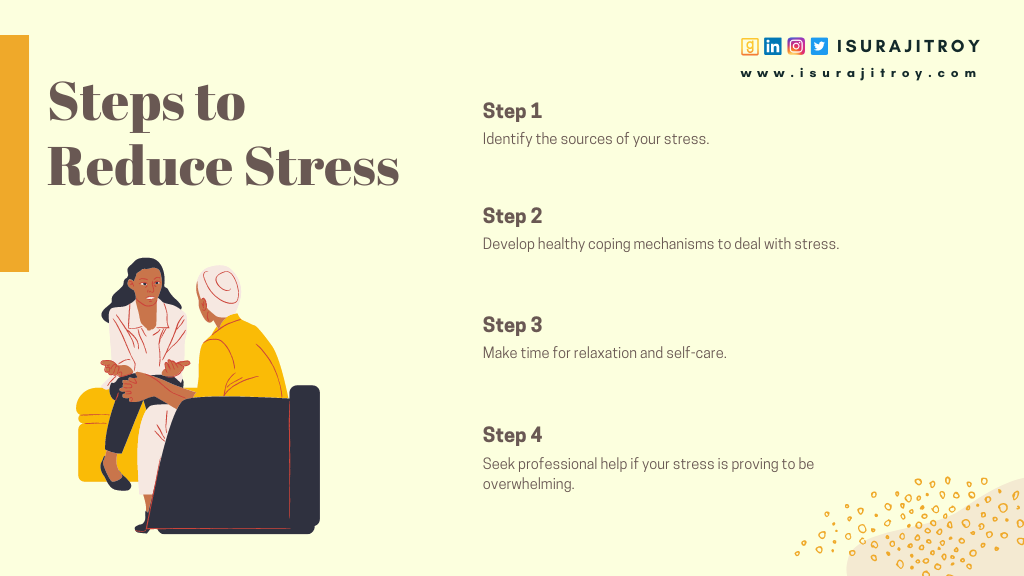
In today’s hectic world, it’s more important than ever to find ways to reduce stress and anxiety. When our minds are constantly racing and we’re constantly juggling different tasks, it can be difficult to find a moment of peace. This can lead to mental health issues such as anxiety and depression.
Mental stress can have a negative impact on our physical health. It can lead to problems such as headaches, stomachaches, and insomnia. It can also make us more susceptible to infections and diseases. Therefore, it is important to find ways to reduce our mental stress.
There are many ways to reduce stress, but one of the most effective is to simply take some time for yourself each day. Dedicate a few minutes to doing something that you enjoy, whether it’s reading, listening to music, or taking a walk. This will help to clear your mind and give you a break from the constant stressors in your life.
It’s also important to find healthy coping mechanisms for dealing with stress. This might include exercise, journaling, or talking to a friend. When you have healthy ways to cope with stress, you’re less likely to turn to unhealthy coping mechanisms such as alcohol or drugs.
If you’re feeling overwhelmed by stress, it’s important to seek help from a mental health professional. They can help you to identify the root causes of your stress and develop a plan to reduce it. Don’t try to tough it out on your own- seeking help is a sign of strength, not weakness.
Eight steps to reduce mental stress
- Identify your stressors: Make a list of the things that are causing you stress. Include both external stressors (such as work, family, and financial problems) and internal stressors (such as negative self-talk and unhelpful thinking patterns).
- Avoid or eliminate your stressors: If possible, avoid or eliminate the things that are causing you stress. This may not always be possible, but it’s worth a try.
- Change your thinking: One of the quickest ways to reduce stress is to change the way you think about things. If you’re constantly dwelling on negative thoughts, try to focus on the positive.
- Practice relaxation techniques: relaxation techniques such as deep breathing, meditation, and yoga can help you feel calmer and more relaxed.
- Exercise: Exercise is a great way to reduce stress and improve your overall health.
- Get enough sleep: Sleep is important for both physical and mental health. Make sure you’re getting enough rest each night.
- Eat healthy: Eating nutritious foods helps your body to function at its best.
- Connect with others: Spending time with loved ones can help reduce stress.
Benefit for your mental health
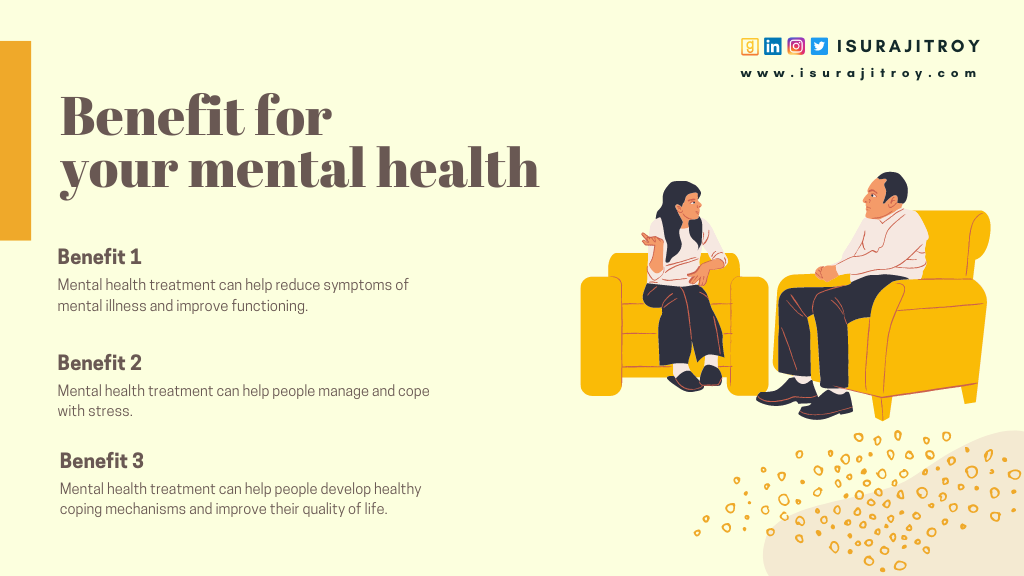
It is often said that good mental health is the key to a happy and successful life. And there is a lot of truth to that. Mental health refers to our emotional, psychological, and social well-being. It affects how we think, feel, and act in our daily lives. It also helps determine how we handle stress, relate to others, and make choices.
Good mental health is not just the absence of mental illness. It is also the ability to cope with the challenges of life in a healthy way. We all have times when we feel down or stressed. But if these feelings last for more than a couple of weeks or interfere with our daily lives, they could be signs of a mental health problem.
There are many benefits to maintaining good mental health. People who are mentally healthy are more likely to be successful in school and work, have healthier relationships, and enjoy better physical health. They are also better able to cope with stress, setbacks, and difficult life events.
Maintaining good mental health is important at every stage of life, from childhood and adolescence through adulthood. There are things you can do to stay mentally healthy and to help keep your loved ones mentally healthy as well.
Top seven benefits with short description of mental well-being
- Mental well-being can lead to improved physical health.
- Mental well-being can help you cope with stress and adversity.
- Mental well-being can improve your relationships.
- Mental well-being can increase your creativity.
- Mental well-being can improve your decision-making skills.
- Mental well-being can help you find meaning and purpose in life.
- Mental well-being can lead to increased happiness and satisfaction with life.
Conclusion
Mental health treatment is a process of helping people who have mental disorders. It can involve a combination of different therapies, medication, and lifestyle changes. Mental health treatment is an important part of overall health and wellbeing. It can help people manage their symptoms, improve their functioning, and prevent further mental health problems. Mental health treatment can be very effective when it is tailored to the individual’s needs. There are a variety of different types of mental health treatment available, and the most effective approach depends on the individual’s diagnosis, symptoms, and preferences.
Mental health treatment can include medication, psychotherapy, or a combination of the two. Medication can be used to treat the symptoms of mental illness, such as depression, anxiety, or psychosis. Psychotherapy can help people understand and work through the issues that may be causing their mental illness. Mental health treatment is most effective when it is ongoing and long-term. It is important to find a mental health professional who you trust and who you feel comfortable working with. It may take some time to find the right fit, but it is worth the effort.





